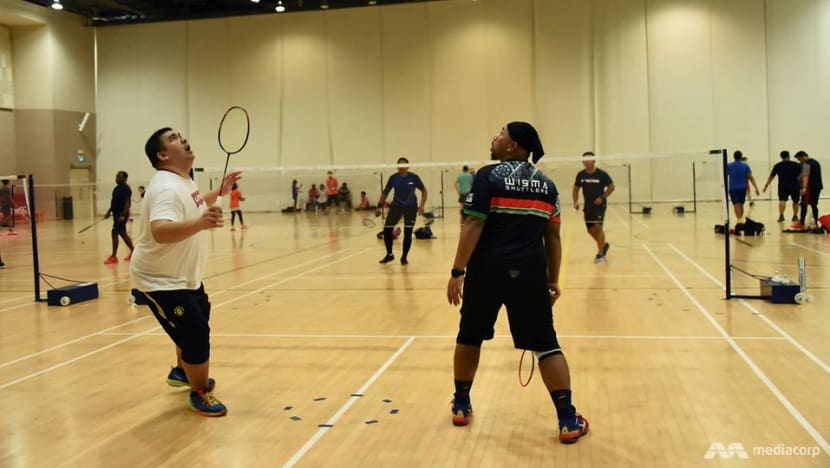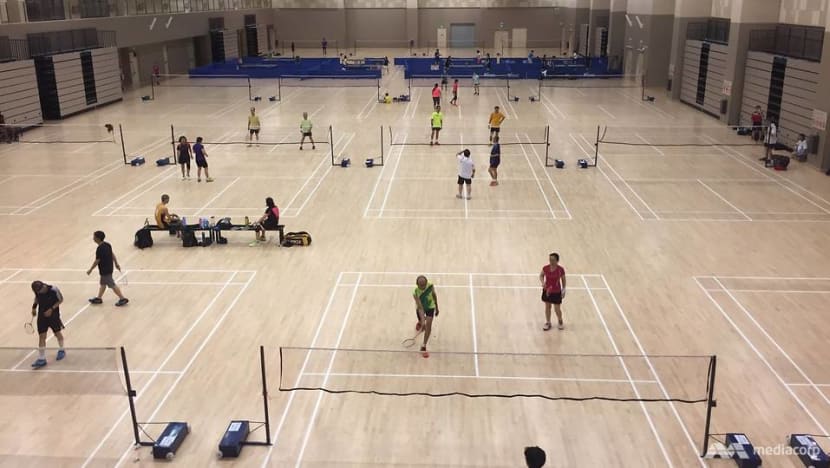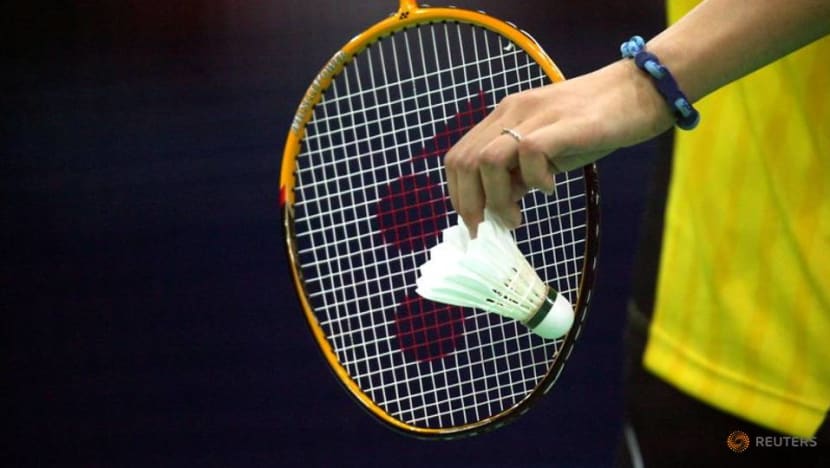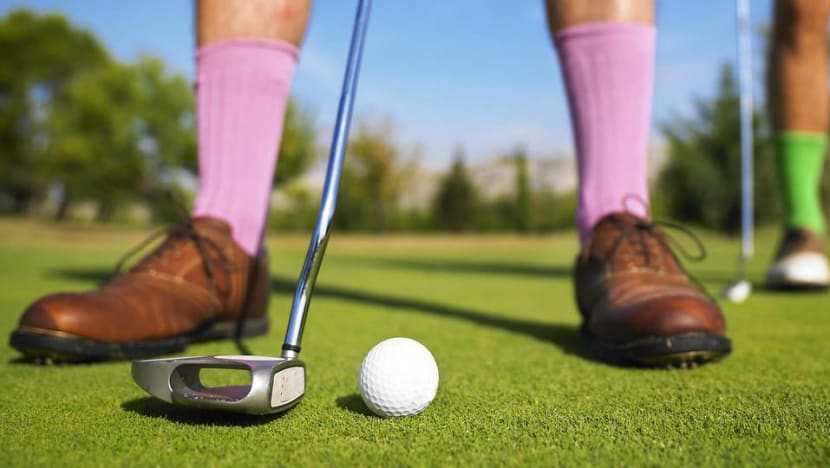Commentary: The curious mania over booking badminton courts in Singapore
The difficulty of booking courts has been a hot button issue in the badminton fraternity for decades, says Jan Lin Lee.

People playing badminton indoors at Our Tampines Hub on Jun 20, 2020. (Photo: Try Sutrisno Foo)
SAN FRANCISCO: COVID-19 brought dramatic disruptions to various industries and sectors of our societies. For the sports industry in particular, the outlook remains rather grim.
Professional sports leagues may have resumed in a “bubble” environment but even with restricted number of spectators socially-distancing in the stands, it is just not the same. For both fans and athletes, it’s the complete opposite of everything we have come to embrace of sports events and entertainment in the 21st century.
Within recreational sports, the fitness industry went from booming to zooming. Fitness enthusiasts turned to virtual classes to keep their fitness regime going, while many beloved fitness gyms have filed for bankruptcy.
In recreational team sports, the reduced number of players permitted to play together in person have killed much of the fun of playing the sport.
READ: Commentary: It is time social media played a more important role for football clubs
READ: Commentary: When gyms finally reopen, can we get rid of toxic gym culture?
And then in Singapore, there is the curious case of a surge in demand for badminton court bookings. Reports have emerged that badminton players are having a difficult time reserving public indoor courts, with some even resorting to buying slots from resellers on platforms such as Carousell and Facebook.
ActiveSG, the portal which manages public sports facilities, said it has since suspended and blacklisted 255 accounts guilty of reselling bookings.
A DECADES-OLD ISSUE
Even before the pandemic, I have witnessed this uniquely Singaporean frustration from where I write in the US Bay Area. It’s home to the sport’s most popular online forum, Badminton Central – where I would sometimes chance upon players frustrated about how impossible it is to find available badminton courts in Singapore, especially during after-work “peak” hours.
Badminton is an enduringly popular recreational sport in Singapore. It was reported by the Straits Times that in 2019, there were over 810,000 badminton court bookings, topping all other sports facilities.

Even with the 2015 implementation of the “Dual-Use Scheme”, which opens selected school facilities for public use, it remains a challenge to book badminton courts. COVID-19 has complicated and limited the usage further.
But the difficulty of booking courts has been a hot button issue in the badminton fraternity for decades. I remember experiencing this frustration in my teenage years back in the 1990s as a school athlete in the sport.
Fortunately for us, we always had a teammate or a friend who lived in a condominium and would let us use their facilities.
While it’s easy to see how COVID-19 restrictions have greatly exacerbated the situation, I’m surprised that after all these years, authorities have yet to intervene to alleviate the facility stress for one of the nation’s most beloved grassroots sports.
Just what is going on?
READ: Commentary: The Australian Open has lessons for large sports events in Singapore
READ: Commentary: COVID-19 has forced us to rethink stadiums and sports facilities
STRAIGHTFORWARD SOLUTIONS AVAILABLE
The accessibility of the sport underlies badminton’s popularity throughout Southeast Asia. In Singapore, we are also blessed with high-quality public sports facilities.
For instance, the Punggol Regional Sports Centre scheduled to open in 2023 will add 20 more badminton courts in the country.
However, a deeper look at the issue will reveal that it may have less to do with a scarcity of badminton courts, but more an inefficient and unsound facility booking system.

The local badminton fraternity has been advocating for some straightforward solutions for years.
First, bookings should be allowed for cancellation. When there is so much demand, especially in this unprecedented time, it’s bizarre that ActiveSG still does not allow users to cancel their bookings, to free up slots that are going to amount to a no-show.
Second, there should be tighter restrictions on how many “peak slots” – weekdays from 6pm to 10pm and the whole of weekends and public holidays – each user is permitted to book, as this is where the squeeze is most felt.
Many have reported that within a minute of these slots opening up for booking 14 days in advance, all the peak slots would have been fully snapped up. This is akin to booking tickets for a Jay Chou or BTS concert in Asia.
READ: Commentary: Why sports still has a place in Singapore
WATCH: Rise in demand for school sports facilities as more activities resume in Phase 3 | Video
Currently, ActiveSG allows for a maximum of two peak slots to be booked per day for each user – but it could consider limiting this number further. For instance, each user could be permitted to book up to a few number of peak slots a month, and cancellation will enable them to rebook.
The COVID-19 restrictions have reduced availability and has likely led to hoarding behavior. Some players may be snagging as many slots as they can, first, then deciding whether to show up later, especially when there’s no penalty imposed on no-show bookings.
Hoarding behavior aside, the current set-up above allows for a “black market” to fester, where opportunistic resellers book as many timings as they can, then hawk them for a profit on third-party platforms. Any black-market resale behaviour of public facilities should be illegal and prohibited.

Badminton groups, however, could sell "membership" that includes their acquisition of these courts for the group. Membership fees are for the organising of this group activity with perks like free shuttlecocks usage, rather than for a direct trade of facility usage.
ActiveSG-registered badminton coaches could also be given some kind of priority to book courts.
READ: Commentary: Why success should not be the only factor in deciding what is Singapore’s national sport
TIME FOR INNOVATION AND BRANCHING OUT
Faced with the near-impossibility of scoring a facility booking, what’s a badminton lover to do?
It’s uncanny that the sport’s governing body, the Badminton World Federation, officially inaugurated AirBadminton and the new outdoor shuttlecock AirShuttle in 2019.
Known for its increased visibility, durability, stability and wind resistance, AirShuttle is a much-needed innovation that enables badminton enthusiasts to play the sport outdoors properly and competitively.
Gone are the days of frustration for open-air HDB badminton court users, where the wind is our biggest enemy in keeping the shuttlecock in play.
READ: Commentary: There is no shame in cancelling the Olympics now when options remain
If you are an indoor badminton purist however, there is a cousin in the name of golf. I have picked up golfing in the US because it’s as accessible in America as badminton is in Singapore. I was surprised to learn how having the badminton-swing muscle memory makes learning golf quite a breeze.
Golf’s popularity as a recreational sport skyrocketed in 2020 as it became the go-to sport under all of COVID-19’s restrictions.
As an outdoor sport it comes with plenty of social distancing, yet it’s also a great bonding sport playable in a group of two to four. You could also choose to golf or hit the driving range on your own.

While golf may still be perceived as a sport for the wealthy across Asia, it’s relatively accessible in Singapore.
A round of nine-hole golf at a public golf course like Mandai Executive Golf Course or Champions Golf in Bukit Timah starts at S$25 per person, depending on playing days and time.
Mandai’s driving range also currently starts at just S$2.40 for a bucket of 40 balls.
READ: Commentary: Is golf dying in Singapore?
READ: Commentary: Golf classes? What it really takes to raise a future CEO
If golf fails, try pickleball. A combination of badminton, tennis and table tennis, pickleball can be played outdoors. It’s also easy to pick up, considering how it was invented by three dads in 1960s America as a form of entertainment for their families.
It grew to become very popular in the US since then. There’s also a small but vibrant pickleball community in Singapore.
So many sports we play today are the innovation of regular people in the past. As a nation existing in an unprecedented time, we can also see the pandemic as an opportunity to innovate new sports, that who knows, may just become an Olympic sport one day.
A film producer based in California, Jan is a former school badminton player and has fond memories working on the professional badminton circuit and for the Olympics as a media professional.














